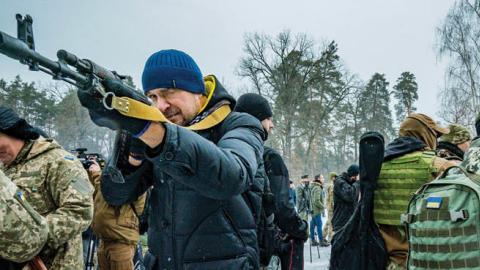Russia wants to absorb Ukraine and rule its people. China wants to absorb Taiwan and rule its people. The two powers isolate and degrade their much smaller neighbors at every turn and invoke stale grievances to justify conquering them outright. They have served notice on the world that they are prepared to make war to impose their will. Frantic countermeasures are under way, focused for the time being on averting an invasion of Ukraine or a Moscow-backed coup.
The bellicose Russian and Chinese overtures have provoked wide fear and revulsion. Fear because either military resistance or successful annexations could lead to further aggression by Russia and China and wider wars involving other European or Asian nations and the U.S. Revulsion because Taiwan and Ukraine are free democracies in the crosshairs of murderous dictatorships.
These are vital considerations for understanding and responding to the emergency. But there is another, more elemental consideration. Whatever their covetous neighbors say, Taiwan and Ukraine have the essential features of independent nationhood. Provenance and their own exertions have given them the moral right to national self-determination, for three reasons.
First, they occupy and police clearly defined territories inhabited and cultivated by millions of citizens. Their territorial boundaries involve a few incidental disputes, like those that pepper hundreds of other national borders; these are matters for routine diplomatic negotiation and are irrelevant to their neighbors’ designs on their entire territories.
Second, they are self-conscious polities with their own histories, traditions and institutions of government, commerce and civil society. Their diversities of ethnicity, language and religion are typical of many modern nations. People with ties of language and heritage to Russia and China enjoy full rights of citizenship. Most important, sundry group loyalties are thoroughly entwined with patriotic identity and allegiance: Large majorities regard Ukraine and Taiwan as their national homes, familiar and admirable, and are ready to fight and sacrifice alongside their countrymen to preserve their independence.
Third, they are peaceable. They have no interest, not to mention ability, in invading China or Russia (or any other neighbor), or to rule their peoples, subvert their institutions or interfere with their corresponding prerogatives as independent nations. Their militaries, and military alliances with other nations, are strictly defensive, with no purpose other than to counter manifest external aggression. The threats to national self-determination are wholly one-sided.
The national status of Ukraine and Taiwan is critical because the nation-state is a critical achievement of modern civilization. It is the product of centuries of social evolution and has proved the most productive, beneficial form of human politics yet devised. It is the indispensable building block of efforts to address regional and global problems. The order of self-governing nations deserves our attention and respect as a stupendous inheritance, one that needs our protection if we wish to keep it.
These assertions may sound strange. The nation-state was born in strife and bloodshed and has been the scene of horrific ethnic and religious conflict. Nationalism is said to have been the root cause of major wars. More than a few nation-states are brutal dictatorships indifferent to the welfare of their citizens. And who among us cannot recite a litany of objections to our own nation’s government and political system? No wonder that progressive idealism, once attached to “national self-determination,” has shifted to globe-spanning agencies and human-rights movements that transcend parochial national interests.
But these constructions are myopic and misleading. Folly, pride and malevolence are constants of our species, but so are reason, piety and benevolence—and the rise of the nation-state is thanks to its relative success in managing the former and making space for the latter. Nation building, beginning in the 16th century and gathering steam in the 18th, promoted diversity, equity and inclusion—and freedom to boot.
As Boston University’s Liah Greenfeld has demonstrated, the modern idea of social equality grew from efforts to transform class-ridden societies into inclusive national communities and to convert aristocracy-ridden governments into meritocratic ones.
The canonical freedoms of religion, speech, inquiry, association and enterprise were instituted to solve problems—wars of religion, out-of-touch ruling elites, static commerce, dogmatic science—that stood in the way of effective nationhood.
Whatever philosophers may declare, in practice there is no such thing as a supernational right: Rights of legal process, political participation, minority protection and security of hearth and home are enjoyed only by those who are part of a political community with the will and wherewithal to enforce them.
Most of today’s successful nation-states are conglomerations of racial, ethnic and religious groups that have become, on balance, sources of dynamism rather than conflict.
Each of these developments was spurred by competition with other countries that were learning the arts of nationhood and reaping commensurate rewards of wealth, independence, cultural achievement and mastery of the physical world. In premodern times, when “nations” meant racial, ethnic or religious groups, rivalry was based on immutable personal characteristics and tended to turn violent and zero-sum. When “nations” became geographic territories with diverse and overlapping population groups, rivalry shifted, productively, to institutional arrangements, management of domestic divisions and cultivation of the spirit of shared identity and purpose.
These tendencies aren’t the whole story, and we see a wide variety of practices and traditions among the world’s nearly 200 nation-states. That variety is itself a strength, akin to that of American federalism. Ukraine is said to be a “fledgling democracy” with a ways to go to meet supposedly high Western standards—but it is a conservative, relatively religious nation with a brave fighting spirit that is impressing friend and foe alike. Older and richer Taiwan features raucous conflict between progressive and conservative parties—yet they have mastered the art of regular, peaceful transfers of government. Fun fact: Taiwan’s constitution has a unique fourth branch, conceived by Sun Yat-Sen, that independently polices government performance and corruption with powers of censure and impeachment. Both major parties would like to be rid of this nettlesome innovation, but I hope that they keep it and that others take note.
For all its variety and many flaws, modern nationhood is in a class of its own and recognized as such. In the 1930s, Germany and Japan talked the talk of aggrieved nationhood—but they walked the walk of race-based, imperial conquest and had to be put back in their place at terrible cost by real nation-states of diverse traditions and interests. Today Russia and China conflate aggrieved nationhood with empire and subjugation and, for China, racial destiny. If they were normal nation-states, with the three essential features I have described, the world would be vastly more secure, peaceful and prosperous (even more so if Iran were to join the club). And their own great cultural achievements would be much more widely admired and studied.
The Russian and Chinese threats focus the mind on how the order of nation-states is to be protected. The “collective security” template at the heart of the League of Nations and United Nations, in which all member nations pledge to take seriously aggression against any other, is too wide and shallow to be effective. The North Atlantic Treaty Organization’s much firmer pledge has worked better but is limited to a restricted group of similar nations. But all three institutions undermined the national order by obscuring security responsibilities. The league and U.N. oxymoronically made “national self-determination” a dispensation from an “international community,” and NATO transferred significant European security responsibilities from its own nations to the U.S.
I think there is no better alternative than leaving security challenges to the judgement of individual nations from case to case, weighing their own national interests and their collective interest in protecting the national order. That, in any event, seems to be how things work in practice, as in the current crisis. Japan and Australia have effectively pledged to help defend Taiwan militarily in league with the U.S., while South Korea has demurred (it says it won’t fight alongside Japan). France, the U.K. and Poland, along with the U.S., have been outstanding supporters of Ukraine, while Germany has gone to extraordinary lengths to deny support.
Why is the Taiwan coalition planning on joining actively in military defense, while the Ukraine coalition is limiting itself to providing military supplies and intelligence and logistical support? Taiwan, excluded from most international organizations at China’s behest, has carefully cultivated bilateral political, commercial and cultural ties with the U.S. and other powerful nations, and it has been a conspicuously better world citizen than China, as during the Covid pandemic. Self-determination takes time, and Taiwan, which has been effectively independent since 1949, has had more time than Ukraine, which withdrew from the Soviet Union only in 1991. But the decisive reason is that the U.S. correctly sees China as a far more serious threat to American interests and menace to world peace and stability than Russia.
Whatever the upshot, I would like to see, in these and future cases, greater recognition of the integrity of the nation-state and its value to others. If Ukraine’s plight is judged less important than Taiwan’s to the interests of other nations, so be it. But that is no excuse for the disparagement of Ukraine, in some European and American quarters, as less than a “real” nation worthy of our attentions. The Ukrainians’ astonishing defiance in the face of massive military mobilization is an object lesson in the value of the nationalist spirit to international order. It is unmasking Russian ruthlessness while others equivocate, and may itself be a sufficient deterrent unto the day.
Here is a parting thought for giving nationhood a rhetorical boost in the councils of government and public opinion. The word genocide, meaning the extermination of a people for their race or ethnicity, describes an act so monstrous that its very application can influence debate and action. It could be useful to have a cognate, perhaps nationcide, to describe the extermination of the national civilization a people have built—customs, traditions, civil associations and practices of self-government—which many of them will deem as precious as life itself.
Read in the Wall Street Journal

















